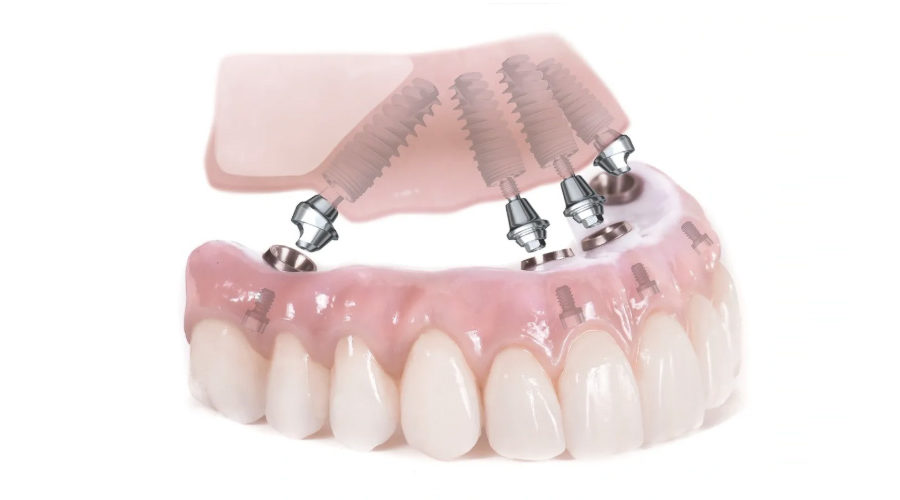Dental implants are usually utilized in case of missing teeth/tooth to restore the patients dentition and proper function.
Every patient and every situation is unique.
Depending on the patient and the end result expectations and number of missing teeth or teeth to be lost, many dental implant options can be considered, like a single tooth dental implant, or bridge supported dental implants, when a few teeth are missing.
In case of several missing teeth or teeth with hopeless prognosis, both fixed and removable denture solutions can be considered.
When it comes to implants, what are my options?
A Single Tooth Replacement
Do you have a missing tooth?
Dental implants are a great solution for replacing a single missing tooth.
Tooth loss, whether it is due to dental decay, periodontal disease or trauma, over time can cause many serious dental issues. Adjacent and opposing teeth will shift, closing the gap where the missing tooth was once. This may result in abnormal spacing and teeth gaps, mal-alignment and gum disease along with other problems like an abnormal and a traumatic bite and even TMJ problems.
For some patients, a bridge may be a good solution. For others, the better solution is an implant.
If after a proper examination, diagnosis and discussion of all your options you’ve decided to go with the Implant route you need to know whats involved.
The dental implant process involves a few steps. First, if the tooth or part of it hasn’t been removed then it needs to be extracted. The empty socket in the jaw then must heal up. A bone graft option can be provided to speed up the rate of site healing. Once healing is established, the implant can be placed in place. It takes several weeks to months for the bone to bond and fuse with the implant properly.
Once the bone and implant have fused, a post will be secured onto the implant to serve as a base for the prosthetic tooth. Implants should look natural once restored. So a proper tooth colour shade, size, and shape that matches the rest of your dentition will be established for a beautiful and natural final appearance.
When properly cared for, your dental implant should last a lifetime!
An Implant Supported Bridge
Are you missing a few adjacent teeth?
If so, an Implant-supported bridge can be a great solution for those who don’t want to deal with the hassle of a partial denture. It’s also a great option for those who may not be good candidates for a traditional dental bridge, which requires solid teeth in robust conditions on both sides of the gap.
An Implant-supported bridge is used to replace two or more adjacent teeth. The prosthesis is anchored in place with two or more dental implants placed in the jaw bone.
The empty tooth sockets first must heal and fill up with bone after the tooth loss or extraction which can be helped and accelerated by considering a bone graft at the time of extraction. Then dental Implants will be place and given time to fuse with the jaw bone.
Once the jaw bone to implants fusion is complete — usually after a period of 6 to 9 months posts will be attached to the implants to serve as basis and connections for the dental bridge prosthesis.
With proper care, your Implant-supported bridge can last a lifetime.
Implant Supported Dentures
Are your dentures loose and never seem to stay in place, even with all that gooey denture adhesive product?
Implant supported dentures can be a great solution to give your dentures stability and retention.
Implant-supported dentures are great for patients who have lost all of their teeth or need to get their damaged or loose teeth pulled out. Many partial dentures are supported with a few remaining teeth, this usually overloads and strains those remaining teeth and patients are more likely to lose those teeth eventually as a result of the extra loading.
When those teeth require extractions, the patient is left with a full denture, which has no anchors making them uncomfortable and challenging to wear.
Implant-supported dentures are secured in place by a few small attachments to implants that are anchored in the jaw bone.
If tooth extraction is required, a bone graft can be an option to help speed the healing process. Once the bone has healed, implants are placed and left over the next few months to fuse to the jaw bone. After that small parts are fixed to those implants which will serve as connection points to attachments located in the denture. so you can fix the dentures in place by means of those implants! This provides a permanent solution for secure and stable dentures that look and feel and great.
All On 4
Are you sick of dentures and want something fixed in your mouth that doesn’t require removal several times a day?
All on four can be the solution!
It involves placing four or more dental implants and then fabricating and fixing dentures to them. With all on four dental implants, the denture is secured into place with the implants and it stays in place while you eat even tough food, like a steak or an apple.
All on four can be an option for patients who lost all or almost all of their teeth. Remaining teeth will be pulled before placing the implants. Bone graft may be needed to enhance the healing process.
Implants are placed into the jaw and left to bond with the jaw bone. The bonding process will take about six months, during which new teeth will be fabricated and later on secured to the implants priorly placed. Once in place, you’ll have a brand new smile, with teeth that will look and work just like natural teeth!
Hard foods like apples, steak and other previously off-limit foods are now on the menu! And you won’t have to worry about your dentures falling out, nor will you need to bother with having to remove your dentures several times a day.

